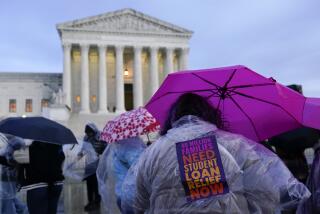Filling a financial need
In “Payday scammers or saviors,” the March 25 installment of “Dust-Up” by Paul Leonard and Christopher Thornberg, Leonard claims that payday loans prey on the vulnerable. Payday loans have advantages along with drawbacks, just as any other financial tool for consumers. What their harshest critics fail to understand is that, by and large, consumers use payday loans in a responsible manner for fast, hassle-free cash advances to make it from one paycheck to the next.
Despite Leonard’s contention that the payday industry “targets economically vulnerable borrowers with a product that usually does more harm than good,” payday loans fill a quick, convenient financial need that traditional financial institutions fail to cover. Because many banks don’t offer expedient, short-term loans and the immediate access to cash, consumers are driven to payday lenders, especially in an emergency. Consumers are sometimes deterred by the lengthy membership applications and credit background checks involved with credit union loans.
The Center for Responsible Lending and other so-called consumer advocacy groups rely on shoddy research in stirring gender, racial and class sensitivities to make the case against payday loans, as they did during their successful crusades in Georgia and North Carolina to run payday shops out of business. Though they claimed that the elimination of payday loans saved Georgia residents approximately $154 million per year, that claim was refuted by a Federal Reserve report (pdf) indicating that consumers ended up paying more through overdraft bank charges and late fees. Critics of payday loans are content to ignore that the mass of payday borrowers are middle-income, educated consumers.
Though the argument that payday loans trap consumers into a spiraling cycle of debt through high interest rates receives its fair share of airtime, little is said about the consequences of eliminating payday loans as a financial alternative. In his article, Leonard suggests credit unions as an alternative to payday loans. He states: “A number of large credit unions are beginning to offer affordable cash advances to their members as a service, some with savings components to help borrowers save for future financial emergencies. The North Carolina State Employees Credit Union offers an alternative payday loan product, at 12% APR with no additional fees, that has given out $1 billion in small loans to nearly 100,000 members since its inception. The three largest credit unions in California all have affordable short-term loan products as well.”
What he fails to mention is that these cash advances are only available to credit union members, excluding nonmembers from this fast-cash option. While credit unions claim they can offer their customers a better deal, they are challenged to develop short-term loan options for non-members in need of quick cash.
The bottom line is that when federal, state or local governments adopt the role of Big Brother and restrict free-market options, the consumer is always the one that suffers. The Center for Responsible Lending and other so-called consumer advocacy groups would be wise to recognize that consumers are capable of making their own decisions from a broad array of financial tools.
Terry Kibbe is chief public advocate with the Consumers Rights League.
More to Read
A cure for the common opinion
Get thought-provoking perspectives with our weekly newsletter.
You may occasionally receive promotional content from the Los Angeles Times.










